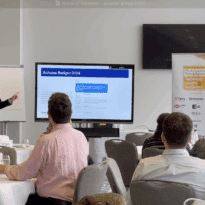Dan Atkinson considers the effects of situations like the Coronavirus crisis and what can be learned from it in terms of the relationship with clients.
First published in the April 2020 issue of professional Paraplanner.
These last few weeks we have been reminded that investment markets definitely go down as well as up. News travels fast and so do viruses. In the thick of things, it can feel like we are out of control. For our clients who are exposed to the media, no matter how rigorous our ‘lifeboat drills’, it has doubtless been a concerning time.
For me this period has highlighted two truths of which I think paraplanners should be mindful:
1) Experience counts
When we ask our clients about investment experience, we are not trying to work out whether they are the next Neil Woodford or Terry Smith. To an extent, we want to understand the complexity of decisions and products that they have used in the past. This might be relevant if we are considering higher risk or complex products. However, it’s not just this we want to understand. Past experiences can inform future behaviour.
Recent market conditions have provided a reminder that our investment experiences matter. I remember producing client reviews during 2008/9 with negative returns. I also remember that there was a recovery. I know that some of you will have similar memories and experiences.
However, some of you may not have this experience. What feels ‘normal’ to you is the relatively low volatility of the past few years. There have been falls but they have tended to be limited and short lived. These might even have been described as ‘corrections’ as though markets had been ‘wrong’ when they are just an aggregate measure of price movements over time. The most recent falls and general panic are very different.
It’s quite natural to feel worried when you read these things. This is exactly what the headlines are designed to do, and our loss aversion kicks in. We are emotional beings, so it’s OK to have these emotions. However, the thing that matters is how you behave.
We could let our emotions drive us to sell to cash out of fear that things will get worse. Indeed, they could get worse. However, with the benefit of experience we can remember how it felt in previous times and how staying firm meant we participated in a recovery of values. We can balance our current emotions with our historic experience. The combination of the experiences and how we react to them is a crucial factor in determining how much risk a client should take.
2) It’s easier when it’s not your own money
All of the above is great, but it’s easy to sound trite. We can pull up charts and quote numbers which support our point. We can run the numbers and cashflow models to demonstrate the long-term impact – or lack of impact – of the short term.
We may well be technically correct. We might even point out opportunities to offset capital losses in the portfolio against long term gains. This could indeed result in the client ending up in a more risk appropriate portfolio whilst paying less tax.
However, we need to remember that the client has seen the value of their investments reduce. The number on their statement, representing part of their hard earned or inherited wealth, has gone down. These numbers also represent their ability to have the future they are planning for. For many clients there will be an emotional connection – even if they remain cool, calm, and invested.
As the money we look after for clients isn’t ours, we won’t have the same emotional connection with it. So, when we are communicating with clients at times like this, we need to make the effort to consider their emotions. Combine your technical accuracy with emotional intelligence.
How might we do better?
Firstly, we need to recognise the genuineness of our client’s feelings. They are not machines. It’s ok to have an emotional response to the impact of market movements on our future financial plans. This is not weakness – it’s reality. It’s also ok for them to be perfectly fine with the way things are and not panicked, or worried, in the slightest.
Habit 5 from Stephen Covey’s book, 7 Habits of Highly Effective People, is ‘Seek first to understand, then to be understood’. Let’s make sure we understand what our clients are feeling before we start communicating. Armed with this understanding we can present our technical input more appropriately.
Secondly, I think we need to educate ourselves about how this feels to us. I said earlier that it feels different if it’s your own money. One of the benefits of auto enrolment is that most people now have some money invested by default. Investing is more normal than it ever was.
As we are invested, perhaps we should pay attention to what is happening to it? Our investments might be smaller than our clients and we may well have a longer investment horizon. However, if we pay attention to what is happening to our own money, we might better appreciate how clients are feeling. We can build our own emotional library of experiences to reflect back on.
It’s entirely possible that by the time you read this the markets have bounced back and Coronavirus is no longer a concern. Whether it is, or isn’t, this won’t be the only time that markets fall. This is part of the normal experience of investing. Taking the long view, remembering our experiences of the past, we can inform how we react and help our clients maintain their composure. Easy, huh!




































